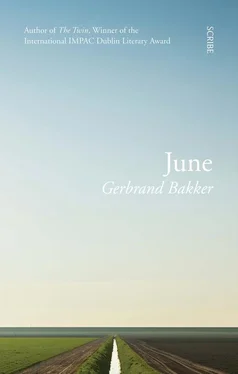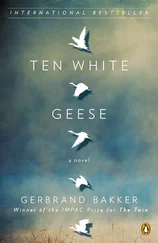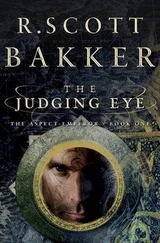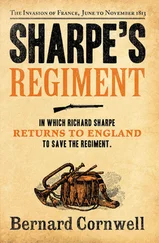He takes the bridge over the canal and from there it’s only a short distance to the Polder House drive. The point of the stick taps on the pavement. One, two, three. One, two, three. He interrupts the rhythm by reaching for his left rear pocket and touching the sealed envelope containing the photo. He slipped a piece of cardboard in to stop it creasing. It’s much too hot for a jacket, otherwise he would have put the envelope in the inside pocket. The back of his shirt was wet the moment he stepped out the front door. The Polder House looks strange to him, so soon after looking at the photos of the Queen’s visit, and after quickly gulping down a third lemon brandy before grabbing the walking stick. There used to be trees here, elms, and old-fashioned lamp posts, and next to the door a sign saying Office hours: 9.00–12.30. Closed in the afternoon. That’s where the Queen, the mayor and a man he didn’t know stood to watch the folk dancing, with that ancient violinist standing next to them playing, his lips thin and tight. He’s buried a hundred metres further along by now, of course. Just like the mayor. The old Queen is interred in Delft, in that big crypt. They stood in the shade of the old linden espalier. He turns around, because he can see that image before him so clearly he almost expects to see his light-grey Volkswagen van outside the bakery on the other side of the canal. It’s not there, of course. Someone is approaching on a bike and he hurries past the Polder House to the cemetery gate. It’s wide open, as if somebody just left.
The baker hardly ever visits the cemetery. His parents were both cremated and he has no other family buried here. Dinie once brought him here to show him her husband’s grave, leaving him to stand there awkwardly while she attacked the headstone with a dishwashing brush (he hadn’t seen a fleck of dirt), threw away some old flowers and put some new ones in their place. The dog lay a few metres away looking in the other direction.
He has a slight headache, which is hardly surprising after three brandies in the middle of the day. He has a hat on the hat rack at home — he can picture it hanging there — but unfortunately he didn’t put it on. More than just protecting your face from the sun — something that’s not necessary now because the sun is hardly shining — the brim of a hat also casts a shadow over your eyes. Just act like you come here often, as if the cemetery is part of your regular afternoon walk. He looks at the inscriptions without reading a single letter. The shell grit under his feet sounds very different from the gravel in his front garden and he’s glad he brought the walking stick; he really is leaning on it now. There’s a bench over there, under a big linden. And now he sees Jan Kaan, or at least a gleaming back and a head with a cloth tied around it. He lowers himself onto the bench, in the middle at first, but there’s a brass plate that jabs him in the back, so he slides across to one side. He stands the walking stick between his legs, both hands on the ivory knob.
Then it gets so quiet he imagines he can hear panting. It seems to be coming from above. Damn it, there are two little birds in the linden. Two little birds that are really hot. If he’s not careful, one will topple over onto his head any minute. He slides back to the other side of the bench, drawing a line in the shell grit with the point of his stick. Jan Kaan rises up a little and looks in his direction. They look at each other, creating a brief possibility of speech, of greeting each other — then the moment is gone. By the time the baker decides to raise his stick up in the air, Jan Kaan is already sitting down again, hunched in front of the headstone.
Dinie Grint is sitting on the sofa in her living room. She’s lowered the awning even further, making it even yellower inside the room, despite the main window no longer being in direct sunlight. Her bare feet are resting on a leather footstool and Benno is sitting in front of it, licking her heels. She’s crying. She’s already reached out to pick up the phone three times, and three times she’s pulled back her hand. You can’t call the police when you’re crying, they won’t understand what you’re saying, and if they do, they’ll think you’re soft in the head. ‘Yes, sweetie,’ she sniffs. ‘At least you’re nice to your mistress.’ The dog looks at her and stops his licking. ‘No,’ she says. ‘Don’t stop.’ The dog obeys.
People at the cemetery are generally nice and friendly. Sometimes they’re not very talkative and she understands that. Sometimes they’re the opposite and then she has to dam their flood of words, so she can have her say too. The council neglects its duties; she’s the one who has to keep her eye on everything, clearing away wilted flowers now and then, with Benno’s fat tail smoothing out the shell grit in the paths as a free extra. Those horrible Kaan boys sent her away from the cemetery. The red-headed monsters!
‘Bah!’ she says, pushing Benno away. She stands up, turns on the radio and looks at the clock. Yes, it’s the Golden Hours . Non-stop hits. She sits down again, swinging her legs back up onto the footstool. They just chased her off. What did they say again? ‘Just go away!’ And, ‘Mind your own business!’ But she does have business there, and she knows what sorrow is. And that cheeky little girl — Dieke, who on earth came up with a name like that? — with her stomach pushed forward and those bright eyes under pale eyebrows. The tone of that ‘Bye-bye!’ of hers was outrageous. They were wrecking the place, whether it was their own grave or not. For the fourth time she reaches out to the telephone. She’s stopped crying, but still doesn’t pick up the receiver. Even if there is someone at the station, they’ll only laugh at her, she knows that, her voice hasn’t calmed down yet. ‘Yes, sweetie,’ she says soothingly, to herself and the dog. She hikes her skirt up a little, then stares at the radio, stunned, as a familiar tune begins and the Edwin Hawkins singers launch into ‘Oh Happy Day’.
She closes her eyes and, instead of Benno’s tongue, feels the draught on her knees in the white ticket booth; the wind blowing in through a hole under the counter, mostly warm, but sometimes biting cold. This song, all through that long summer, and it didn’t bore her for a single minute. The smooth gospel flowing out over all of the heads in the swimming pool, singing about Jesus washing sins away and making no distinction between Christian and non-Christian heads. It was the first summer the radio had been connected to the speakers on the corners of the ticket booth. She sold singles, checked the season tickets, and fished sticky one- and five-cent coins out of children’s hands in exchange for yet another piece of liquorice, another marshmallow.
It was only when she hadn’t seen her son on the diving board for a while that she lifted herself up off her chair to get a better view out over the water, and then she immediately sneaked a glance at Albert Waiboer, standing in the paddling pool with his daughter, his back bent, his feet planted firmly on the bottom of the pool, muscles tensed. She used to daydream about Albert Waiboer. Him doing things to her that her husband couldn’t even imagine. If Albert Waiboer wasn’t there, and he didn’t come often, there was always some other man to look at. And yes, she’d smoked a cigarette now and then, even though that wasn’t strictly allowed; she just set the door slightly ajar and the smoke soon drifted out through the opening. The two little Kaans always came together, and she always greeted them with a cheerful, ‘Ah, if it’s not the Kaan boys again.’ One always pulled a bad-tempered, surly face and the youngest one always swore. They were always unfriendly, they were never fun, not happy or carefree like other kids. And Teun dived off that board so beautifully in his yellow swimming trunks. She didn’t see much of the oldest Kaan at the swimming pool, but the other one, Jan Kaan, who later… in the garage attic… with her son…
Читать дальше












